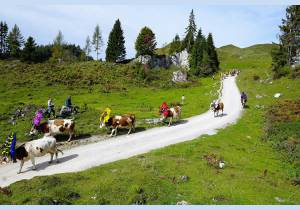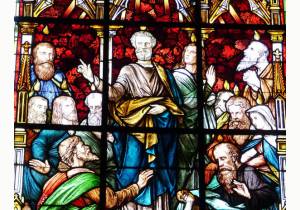Celebrating the Pentecost in Germany: dates, celebration, conventional congratulations, greetings, traditions and customs on the Pentecost
On this page you will find a description of the Pentecost festivities in Germany. Celebration dates by year, customs and traditions common for Germany on the Pentecost, a description of the origin, congratulations & greetings.
Dates for the Pentecost celebration in Germany
The date of the Pentecost celebration in Germany changes every year.
The Pentecost celebration date in Germany:
24 May and 25 May 2026 .
Below is a list of dates for celebrating the Pentecost in Germany by year, provided that in previous and subsequent years the present practice and time of the holiday celebration is preserved:
- (Su) 8 June and (Mo) 9 June 2025 - Pentecost 2025Germany Germany
- (Su) 24 May and (Mo) 25 May 2026 - Pentecost 2026Germany Germany
- (Su) 16 May and (Mo) 17 May 2027 - Pentecost 2027Germany Germany
- (Su) 20 May and (Mo) 21 May 2029 - Pentecost 2029Germany Germany
Related holidays
- Pentecost, 2nd day, 25 May 2026
Other names of the holiday
Holiday name in German: Pfingstsonntag, Pfingstmontag.
Other names for the Pentecost in Germany:
- Trinity Sunday
- Feast of the Holy Trinity
- Shabuoth
- Whit Sunday
- Whitsun Day
Holiday status in the territory of Germany
Pentecost is an extra non-working day (non-working days) throughout Germany – it’s a national holiday.
Wishes and congratulations, greetings on the Pentecost in Germany
No information available.
Description of the Pentecost celebration: customs and traditions:
Pentecost is one of the most important religious holidays in Christianity; it is celebrated on the 50th day after Easter to commemorate the Holy Spirit descent on the first Christians, the event that is considered the day of the Christian congregation formation. The feast is also known as the birthday of the church. It is a public holiday in Germany, a day off from work.
The holiday embraces various customs and traditions, some of them have sunk into oblivion over time, others still exist up to date:
- Decorating the church and altar with freshly cut tree branches.
- Equestrian processions (in German: Pfingstritten) to the fields asking for the blessing of the crops.
- Cooking milk soup with almonds and eggs (in German: Pfingstmilch).
- Ring dances around the Maypole, field or church.
- Pentecost games: knightly tournaments, foot-races, shooting competitions, etc.
- Driving cattle to pastures, procession of decorated animals through populated localities.
The origin of the Pentecost holiday
The event underlying this celebration is the Holy Spirit descent on the first Christians, which took place on the 50th day after Easter and is considered the day of the Christian congregation or church formation. The name of the holiday is associated with the 50th day on which this event took place.
Celebrating the holiday began only in the 4th century AD, hundreds of years after the event per se.
The ways pertaining to the Pentecost celebration (see above on the page) have nothing to do with Christianity and are associated with pagan superstitions and traditions of fertility and protection against evil spirits.
Photos, pictures for the holiday
To enlarge and view the picture, click on it with the mouse button.
-

Сattle with festively decorated horns being driven to pastures on the Pentecost Day
-

Stained-glass window featuring the scene of the Holy Spirit descent on the first Christians on the Pentecost Day
RU-GELD.DE Team
Last updated:

